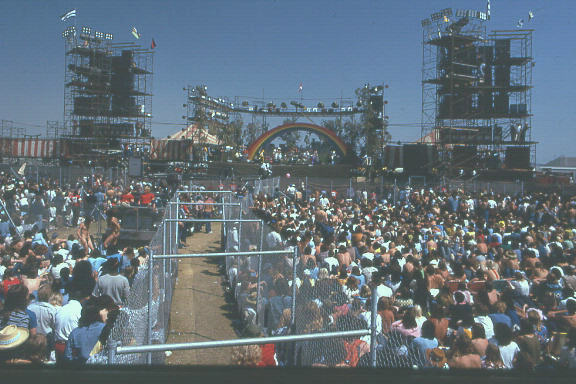Tycobrahe Sound Company
The three top tiers of each sound tower were stacked with columns employing JBL transducers (two 2220A 15" bass speakers, a 2482 driver+horn, and a pair of 2405 tweeters -- all with AlNiCo magnet structures) from three touring Tycobrahe systems whose bands came together at the Jam, plus the spares from headquarters. The equipment on the second level up was provided by Flag Systems. The large bass horns (driven by 3 each specially made Cerwin Vega 18" transducers) on the lower level, plus a few of the JBL equipped columns, were provided by Phoenix Sound. Finally, not visible in this photo, Cerwin-Vega provided the equipment for the "delay" towers located 1000' into the audience.
The Pedal Venture
Though Tycobrahe Sound had been in business since 1968, and was a major participant in the touring sound business of the 1970's, providing equipment for many of the top musical groups of that epoch including The Rolling Stones, Black Sabbath, Deep Purple, Fleetwood Mac, etc., here in the 3rd millennium it is perhaps best remembered for its brief foray into guitar pedal manufacturing (late 1975-77), and the collector's status that those products have acheived.
The entry into the pedal business was partly by design and partly serendipitous. Tycobrahe was already somewhat into manufacturing, having designed and built mixing consoles and power amplifiers for its own use as well as being offered for sale. A "day" business would be useful to keep the crew occupied between shows. Then, one of the client bands brought in an old hand made pedal for repair and that was the tipping point.
Three products were designed for the initial product line launch, additional space was rented, and equipment was purchased to set up a manufacturing line. The housings were made by Wyle, a local aerospace quality manufacturer, and the primerless powder coated paint was their suggestion. After 30 years most of the pedals show some rust from the raw steel beneath. At least the paint hasn't fallen off in large patches as occurred on some GM products employing a similar process in the same era. It soon became obvious that few of the road crew were suited to manufacturing work so "regular" employees were hired.
The pedals made for some good PR, which worked both ways, with the client bands and many were provided to them gratis. The Redwood shipping crates also proved to be very popular as "stash" boxes. One unforseen element of the musical accessory business was the traditional (6-12 months same as cash) "slow pay". As Bob, the owner of Tycobrahe, once so succinctly described it, "I have to pay for parts, labor, advertising, utilities, rent, licenses & taxes to make these pedals but, when I sell one all I get is a (f-bleep) receivable." This was a marked contrast from the touring sound business which was traditionally "paid in full" by show date.
As the receivables approached $100,000 (then the cost of a pair of Los Angeles area middle class homes), financed by monies drained from the cash flow of the sound business, a meeting was held to determine whether to expand the product line and continue the pedal business or to end it. Termination won the day. This device may have also have offered some useful direction:
The Decision Maker
Over the next year, those receivables gradually trickled in and quite some time after the "end" the pedal venture turned a modest profit.
Sveral new pedals were kept in inventory at the shutdown to cover any possible warranty claims and these eventually ended up with some of the employees. A few original Tycobrahe Pedal components are listed for sale halfway down this page:
Parts
The Epilogue
Shortly after the pedal finale, Tycobrahe Sound Co. was sold in 1978, renamed as Innovative Audio which was in turn sold in 1980, and renamed as Schubert Systems Group which I believe is still extant today.

